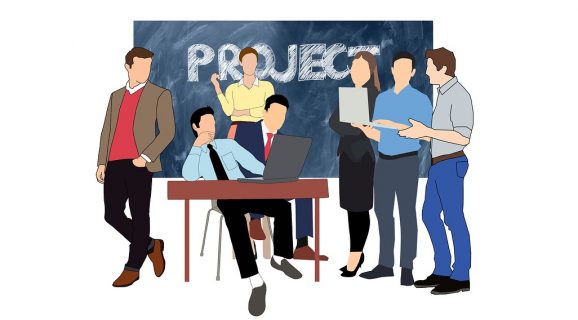
Essential Project Roles
Projects range in scope and size. Large, complex projects must be controlled diligently under a project management framework such as PRINCE2. The primary role of the project manager is to ensure that the tasks associated with the project get done on time and within budget. This means that project managers must:
- Coordinate employees and teams and suppliers
- Keep external stakeholders informed
- Change course if necessary (for example, if budget or project objectives change)
The project manager is naturally at the centre of the project, but part of a larger project management team. In this article, we look at the other roles in a project management team.
Project Sponsor
This is often a c-suite executive, director or senior manager. The relationship between the project sponsor and the project manager is very like that between a chairman and CEO. The project sponsor’s role is to provide support and motivation, engaging people in the project with their own commitment to it.
The project sponsor must be kept up to date with the project’s progress, and will imbed this into the bigger picture of overall strategy. They help direct the project to its goals by:
- Including the project in high-level planning and making strategic decisions
- Approving project budgets
- Keeping higher management informed
- Signing off on resource acquisition
Ultimately, the project sponsor is responsible for ensuring that the project achieves the business opportunity or need, while resolving issues that are outside the remit of the project manager.
Project Customer
This is the person or organisation who has ordered the project, who will gain most from the outcomes of the project. The project customer is also the person with most to lose – it is they who provide the budget for the project.
The Project Board
The project board usually comprises the following, with key people from stakeholder groups:
- Customer
- Users
- Suppliers
The project board’s responsibilities evolve as the project progresses, but include communication between internal and externals stakeholders as well as the responsibility for change decisions and project assurance.
The chair of the board is usually the project sponsor, and the project manager will also sit on this board.
Suppliers
Suppliers include those from outside the organisation who provide materials, skills and labour. Often, the skill sets needed to complete a project successfully will be found externally to the organisation. Part of the project manager’s role is to ensure that these external sources are located and delivered in a timely fashion.
Project Team Members
All project work is different, and requires appropriate professionals and experts to become engaged in the project. Some of these project team members will be involved in the project throughout its lifecycle, while others may come and go or be needed only to complete work in specific project stages.
Project team members must be identified, and may be employed on a full-time, part-time or contractual basis, depending on their skill sets and the project’s needs. Typically, duties of various project team members include:
- Completing project or stage-specific tasks
- Providing essential expertise
- Collaborating with project stakeholders, customers and users to ensure that project work is undertaken to meet business goals
- Contributing to the project’s outcomes
- Documenting process and progress
In my next article, I shall examine how to select the members of your project team. Meanwhile, for all your project management needs, contact Your Project Manager.

